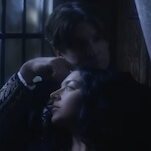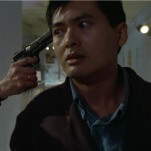Rebel Wilson (Bridesmaids) plays the bride-to-be, and her impending nuptials confuse her bridal party, who speculate in only half-kidding tones about a “magic vagina.” Wilson, after all, picked up the name “Pigface” in high school, but still managed to attract a handsome, successful husband. Meanwhile, controlling Kirsten Dunst, sardonic burnout Lizzy Caplan, and ditzy Isla Fisher remain unattached—at least in any significant way—and troubled by their aimlessness. (Well, the first two, at least. Fisher’s character barely seems capable of tying her own shoes, much less addressing existential concerns.) Goofing on the size of Wilson’s dress the night before the wedding, they rip it, then spend most of the film racing around Manhattan trying to repair it before anyone finds out. That quest sends them bumping up against a bachelor party, which includes a flirtatious potential partner for Dunst (James Marsden), a meek fellow who’s nursed a crush on Fisher since high school (Kyle Bornheimer), and Caplan’s high-school boyfriend (Adam Scott). Headland opens up the play, so the film never feels static as it moves from a cramped hotel room to a cavernous strip club and other locations. In spite of the occasional pause for a monologue, Bachelorette feels like a movie, and it gets enough right as a movie that it’s almost possible to look past the crippling flaw at its core: Spending time with these people is hellish.
That isn’t the fault of the well-chosen cast. The leads flesh out potentially cartoonish characters. Rather than playing a caricature of an idiot, for instance, Fisher goes further, never suggesting a flicker of activity behind her eyes, and finding a bit of tragedy in a character who’s gotten by entirely by looking like she stepped out of an adolescent boy’s daydream. Given the meatiest role, Caplan brings a similar commitment in one early scene, laying out the elaborate rules and passive-aggressive strategizing she brings to oral sex while suggesting she’s wasted her forceful intelligence thinking about the wrong things.
It isn’t even the material’s fault, at least up to a point. Headland has a knack for tart lines and telling moments, and an exuberant approach to profanity and frank talk. But once the film starts expecting viewers to care about the women behind those frank, tart exchanges, it’s already played its best cards. There’s nothing wrong with unlikeable characters, so long as a film doesn’t expect us to like them. Bachelorette tries to have it both ways, making its three leads behave awfully—to Wilson, to each other, to themselves, to the world in general—but pushing them toward breakthroughs and happy endings anyway. At times, it comes this close to moments of real substance, which makes it all the more frustrating when it retreats to its acidic comfort zone. No one here seems to like each other or learn much, and while Bachelorette is admirably free of the normal formulas governing movies that revolve around women and wedding dresses, it doesn’t offer anything more satisfying in their stead. There’s just a lot of sniping on the way to the inevitable “I do” from characters who seem like they’d be better off never seeing each other again.








































